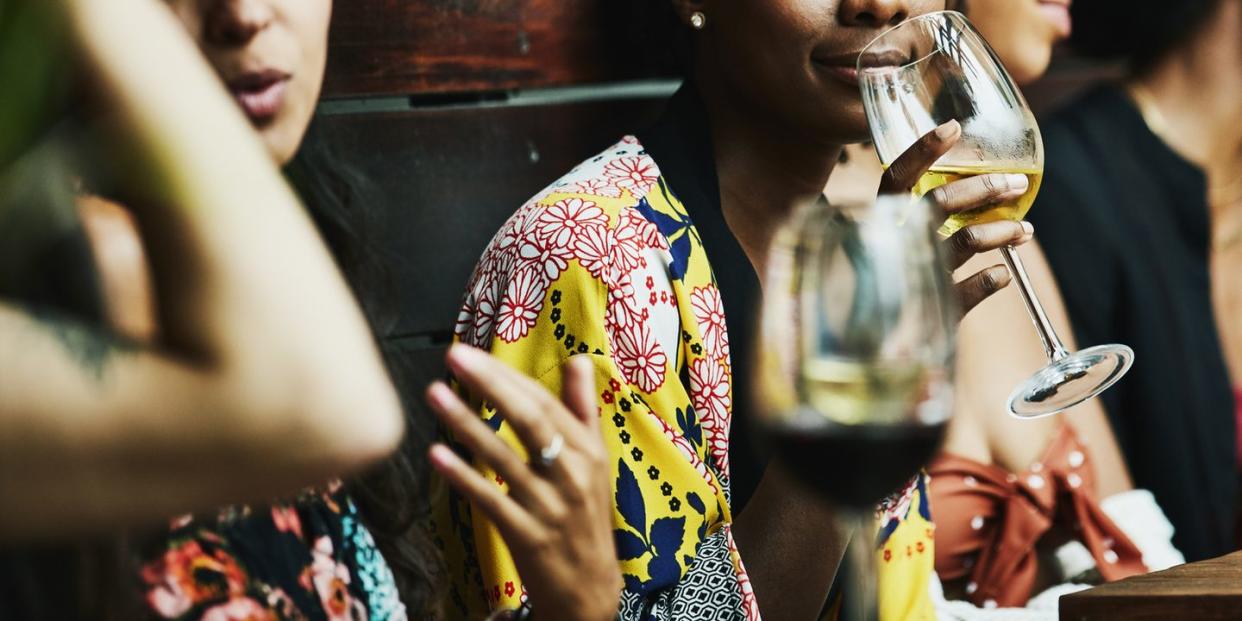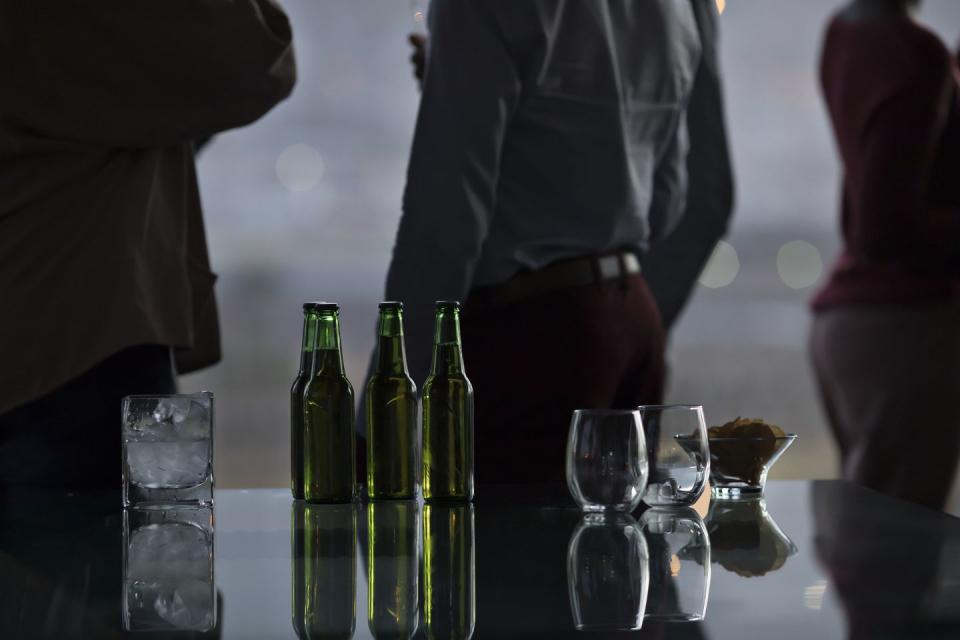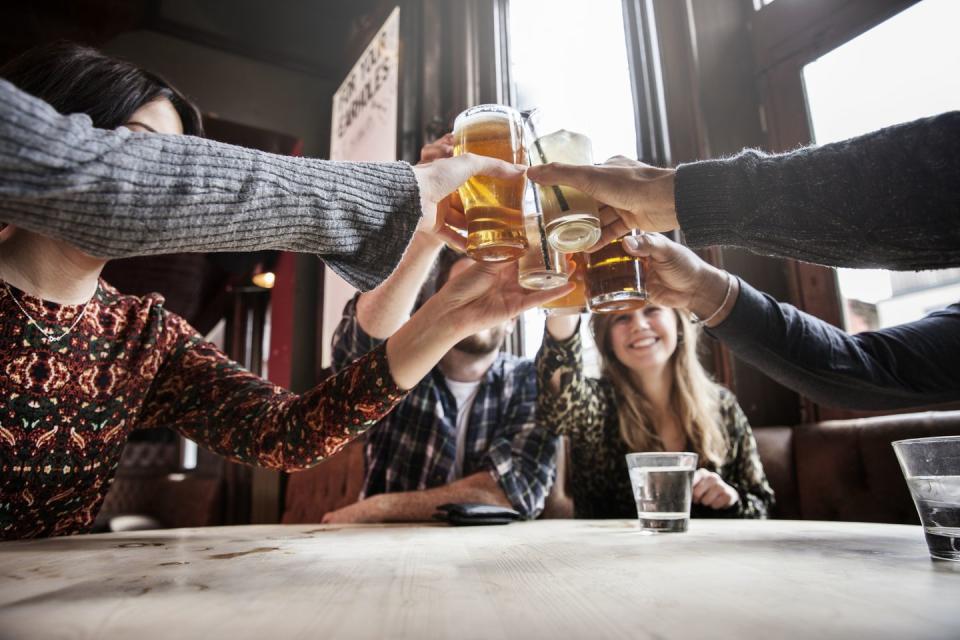Why Do People Give Women A Much Harder Time About Wanting To Get Sober?

You've noticed more and more of your friends abstaining from drinks at the bar recently, yes? That's because it's becoming way more mainstream to say no to booze in a social setting. (You've heard those same friends name "self-care" as a very nebulous reason for abstaining, right?)
In fact, more than half of the American drinking population is trying or has tried to reduce their alcohol consumption, according to a 2019 study from the International Wines and Spirits Record. In that same report, IWSR also found that the brand response is staggering, estimating that the availability of ready-to-drink alcohol products of the low- and no-ABV variety would rise 38.8 percent annually by 2022. And whether they’re capitalizing on or simply supporting a meaningful movement, brands and bars are following suit with zero-ABV “spirits” and cocktail menus for those abstaining. But here’s the kicker: Regardless of circumstance, it is categorically harder for the female-identifying population to explore sobriety in a patriarchal society that does not provide them the same support it does to the male set, according to several industry experts I interviewed on the subject. And that's what makes even looking into sobriety as a woman a revolutionary move.

“Women exploring sobriety, even hypothetically, are treated horribly,” says beverage consultant Joanna Carpenter, a friend of mine who gave up drinking hard liquor in early 2018. She recounts a personal experience that sums it all up:
A fellow bartender once offered me a shot, and when I turned it down and told him I wasn’t drinking, he responded by laughing in my face and saying, ‘Ha, yeah, good luck with that!’ Another time, I was bartending a large event and a distributor sales rep, upon hearing that I don’t drink liquor, proceeded to loudly make fun of me in front of my coworkers and event guests by yelling, ‘Do you even know what you’re doing? How can you be a bartender if you don’t drink?!’
Not all of Carpenter’s interactions in this arena have been negative, but her overall experience has been far from easy. “I’ve encountered great bartenders who are more than happy to whip up a fantastic, exciting zero-proof drink and be supportive and hospitable—but the majority of the time, the sober or sober-adjacent person [is put in] an uncomfortable situation exacerbated by the drinker, not the abstainer,” she shares.
Carpenter notes that when she was drinking, she was often hailed as "successful" by male colleagues. Now, though, "I’m dodging not only suggestive advances but the insinuation that I can't do my job if I’m not downing half a dozen drinks, but I'm also not allowed to have more knowledge than the buyers or bartenders." See: Women who drink "can hang" and are considered to be non-threatening experts in their fields. Exhausting!
Briana Volk, owner of the Portland Hunt + Alpine Club in Maine and author of Northern Hospitality, doubles down: “I have continually watched men be applauded for choosing sobriety or mindful consumption and rally alongside their male peers, while women still feel like they need to be quiet about it in order to keep their jobs," she notes. "For women, there is still a stigma behind it and that has made it harder to speak openly or find the support they may need.”
Volk has actively sought out conversation on the subject with fellow industry members, and one example of this hypocrisy has stuck out in her mind. When she was about 22 years old, she saw two people—a male and a female—struggling with recovery at work: “I knew one woman who was struggling with addiction [whose male boss] told her that if she couldn't handle her alcohol, then she probably didn't fit in with the culture of the company. That same boss bought a male staffer a weekend getaway after he came back from taking time off for recovery. "
It’s imperative to acknowledge that any obstacles white women face are drastically amplified for women of color or other marginalized backgrounds, and sobriety is no exception. Ándrea Pentabona, a Boston-based beverage industry consultant and bartender who is currently in the process of launching HEARD Boston, an advocacy resource database for hospitality professionals, explains: “It's very difficult for me to separate out women in recovery without also recognizing that many of these biases and accessibility issues apply just as much, if not more, to people of color regardless of gender identity, [as well as] the trans community and many other often marginalized groups." Pentabona calls it "impossible" to look at just one aspect of society as it pertains to one set of people (aka white women and white women alone): "[And] the longer we turn a blind eye to the inherent racism, misogyny and class discrimination that rules our society than the longer we will struggle with issues of inequality in all areas of life,” recovery included.
That said, the fact that sobriety is more difficult for all women is not surprising, given how uncomfortable people remain around women who are comfortably themselves. In response to this, Quit Like a Woman author and Tempest Sobriety School founder Holly Whitaker points to recovery as a direct pathway to activism:
If recovery is anything, it’s the first step on the path to radical self-awareness. We begin to tell the truth to ourselves for the first time in our lives, connect to our essential way of being, develop a deep self-compassion, and an appreciation of our fullest individual expression...When we free ourselves from the bonds of addiction, and claim a power we could not otherwise, and turn this power into action, we become, in name, an activist.
She clarifies that one does not need to be sober or recovering in order to be an activist, but that it is a valid path to dismantling the systems that politicize this issue to begin with.
Carpenter agrees with Whitaker’s idea that working toward sobriety, especially from within the industry, is huge: “To prioritize self-care and health in hospitality is radical for [someone] who has been conditioned since the very beginning to adhere to the expectations or demands of others, to take up less space." Volk agrees, pointing to times she's seen bartenders pour women stronger drinks and winking to their male accompaniments: "This is all part of the power dynamic men try to have over women and have succeeded in having for decades. Sobriety or mindful consumption by women is smashing all of those culturally-accepted ideals.”
That said, there's nothing more radical than a woman making her own decisions—and that decision absolutely can revolve around drinking. Ellie Batchiyska, a PR representative for TIPS (Training for Intervention Procedures) makes a case for being mindful to ensure that we’re not condemning women who do choose to drink. “I don't know that I'd label choosing to consume less alcohol as a radical act in the case for feminism, but I do think I'd consider it a bold statement if a woman does choose sobriety for that reason," she says. Ultimately, if a woman finds enjoyment in the occasional alcoholic beverage, she should [be able to] embrace it, and that's that, Batchiyska concludes. The simple act of being secure in one’s choices without reservation—in this case, the choice to drink—is also an empowering act.
While the radicalness of this choice may seem subjective, there’s one thing that’s for sure: Treatment needs to be accessible for all. But should it look different for each gender identity? As it stands now, there is a lot of stigma and predatory behavior in the traditional recovery setting, harm reduction expert Nicky Beyries explains, and "people are more free when they don’t have to worry about feeling intimidated or scared with people of the opposite gender.” So even in the safest of "safe spaces," women are targets, but creating places where men are barred from entry isn't fair to women either.

Natasha David, who owns beloved New York City bar Nitecap, sees the value of gender-specific spaces when it comes to sobriety: “As women, we quite literally feel some sort of fear for our safety or are made to feel uncomfortable on a daily basis, [so]...I understand the popularity of women-only spaces," buuut..."I am a huge believer in inclusivity and think there is great value in people from all walks of life coming together with a shared experience.”
Carpenter adds: “At the end of it all, the focus must definitively be the expansion of an evolving conversation in support of individuals who identify as women who are taking this leap. What we have now is not enough, and that lack is perpetuated by our culture of booze-fueled misogyny.”
We’ve got to have options so we can make our own choices, free of limitations. “Ultimately the existence of programs exclusively for women is just another option for those who are literally fighting for their lives,” says Pentabona. And while we run the risk of exclusion, it’s safe to say that making sure there’s something for everyone—especially those who've made the radical decision to get sober—is the best we can possibly do.
You Might Also Like

